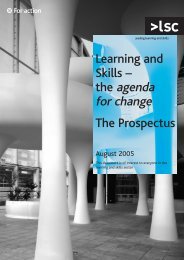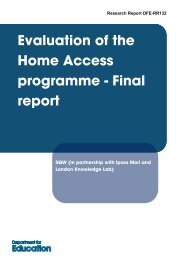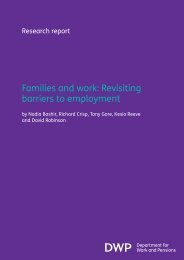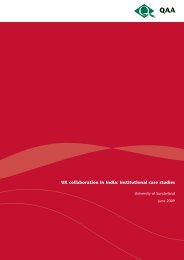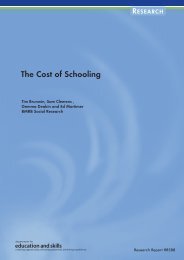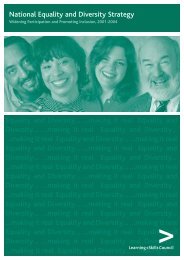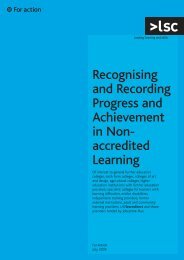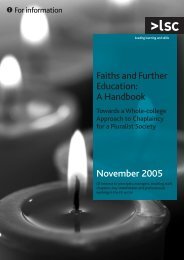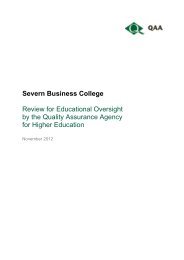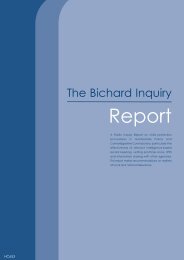The Learning and Skills Councils Annual Report and Accounts for ...
The Learning and Skills Councils Annual Report and Accounts for ...
The Learning and Skills Councils Annual Report and Accounts for ...
You also want an ePaper? Increase the reach of your titles
YUMPU automatically turns print PDFs into web optimized ePapers that Google loves.
1.12 Provisions<br />
Provisions are recognised when it<br />
is probable that the LSC has been<br />
required to settle a present obligation<br />
<strong>and</strong> a reliable estimate can be made<br />
of that obligation. <strong>The</strong> obligation is<br />
normally the amount that the LSC<br />
would pay to settle the obligation at<br />
the Statement of Financial Position<br />
date or to transfer it to a third party<br />
at that time. Where the impact is<br />
material, expected future cash flows<br />
have been discounted using an<br />
appropriate discount rate.<br />
1.13 Financial instruments<br />
<strong>The</strong> LSC has been party to many<br />
contracts in the course of providing<br />
programme funding <strong>and</strong> in the course<br />
of its own operation that have given<br />
rise to assets <strong>and</strong> liabilities in its<br />
Statement of Financial Position. Where<br />
such financial instruments are deemed<br />
to have a significant impact on the<br />
medium to long term financial risk<br />
profile of the LSC, they have been<br />
recognised in the financial statements<br />
in accordance with International<br />
Accounting St<strong>and</strong>ards (IAS) 39 <strong>and</strong><br />
details are disclosed in accordance<br />
with the provisions of IFRS 7.<br />
1.14 Grant-in-aid from the<br />
sponsoring department<br />
All grant-in-aid has been recorded as<br />
financing as it is a contribution from<br />
the LSC’s controlling party giving rise<br />
to a financial interest. It is recorded<br />
as financing in the Statement of Cash<br />
Flows <strong>and</strong> credited to the general<br />
reserve.<br />
1.15 Cost of capital<br />
A charge, reflecting the cost of capital,<br />
is included in the Net Expenditure<br />
Account. This charge is calculated at<br />
the Government’s st<strong>and</strong>ard rate of<br />
3.5 per cent in real terms on all assets<br />
less liabilities, except <strong>for</strong> bank balances<br />
at the Office of HM Paymaster<br />
General. When the average capital<br />
employed over the year is negative,<br />
the cost of capital becomes notional<br />
income.<br />
1.16 Programme accounting basis<br />
<strong>Learning</strong> participation<br />
<strong>Learning</strong> participation programme<br />
expenditure is recognised in the<br />
accounts when the grant is paid to<br />
colleges in line with an agreed profile<br />
<strong>for</strong> the academic year.<br />
<strong>The</strong> LSC has sometimes paid advances<br />
of funding to colleges that experience<br />
cash flow difficulties. <strong>The</strong>se are<br />
repayable, usually over a short term,<br />
through profiled deductions from<br />
future payments. Where they have not<br />
been recovered by the year-end, the<br />
balances are included within advances<br />
<strong>and</strong> FE college debtors.<br />
Capital funding<br />
Funding <strong>for</strong> the building of FE colleges<br />
is recognised in the financial year<br />
that the funding is fully approved <strong>and</strong><br />
in accordance with the LSC Capital<br />
H<strong>and</strong>book. This usually means that<br />
fully verified claims <strong>for</strong> capital project<br />
funding that are received between<br />
2 February in the previous financial<br />
year <strong>and</strong> 1 February in the current<br />
financial year count as expenditure in<br />
the current financial year.<br />
Exceptionally, the conditions of the<br />
capital grant funding to colleges have<br />
allowed the LSC to bring <strong>for</strong>ward<br />
approvals of payments <strong>for</strong> evidenced<br />
capital expenditure, but only where<br />
it has had the funds available to<br />
do so. Where they have occurred,<br />
the approved values have also been<br />
recognised as expenditure in the<br />
current year.<br />
Exceptional funding support<br />
Exceptional funding support provided<br />
to colleges in difficulty has been<br />
charged to expenditure over the life<br />
of the agreed recovery plan, which<br />
typically covers a period of four years.<br />
Where the plan is <strong>for</strong> a period of<br />
greater than one year, this element<br />
of the funding is shown in FE college<br />
prepayments.<br />
Youth <strong>and</strong> adult analysis<br />
For the academic year ending 31 July<br />
2009, allocations to FE institutions<br />
were mainly assigned between Youth<br />
<strong>and</strong> Adult. Only a small element of the<br />
allocations required apportionment<br />
into Youth <strong>and</strong> Adult, <strong>and</strong> this was<br />
based on the allocations already<br />
detailed in the age b<strong>and</strong>s.<br />
Apprenticeships<br />
Apprenticeships programme<br />
expenditure is accounted <strong>for</strong> on the<br />
basis of providers’ actual delivery<br />
(subject to contract value) in the<br />
financial year concerned.<br />
Train to Gain<br />
Train to Gain programme expenditure<br />
is accounted <strong>for</strong> on the basis of<br />
providers’ actual delivery of training<br />
<strong>and</strong> services.<br />
Adult safeguarded learning (ASL)<br />
ASL programme expenditure is<br />
accounted <strong>for</strong> on the basis of the<br />
utilisation of funds paid to local<br />
authorities (LAs). <strong>The</strong> LSC recognises a<br />
debtor at each year-end representing<br />
amounts of unspent funds, based on<br />
use of funds statements submitted<br />
by LAs <strong>for</strong> the academic year that has<br />
ended in the financial year of account.<br />
<strong>The</strong> LSC has recovered any unspent<br />
funds or allowed LAs to utilise the<br />
unspent funds in the following year.<br />
School sixth <strong>for</strong>ms<br />
School sixth <strong>for</strong>m programme<br />
expenditure is accounted <strong>for</strong> on the<br />
basis of amounts that are due to LAs<br />
in order to pay school sixth <strong>for</strong>ms in<br />
their locality. <strong>The</strong> amounts due are<br />
based on the LSC <strong>for</strong>mula funding<br />
<strong>and</strong> the Government’s Real Term<br />
Guarantee.<br />
Finance<br />
LSC <strong>Annual</strong> <strong>Report</strong> <strong>and</strong> <strong>Accounts</strong> 2009–10 51



